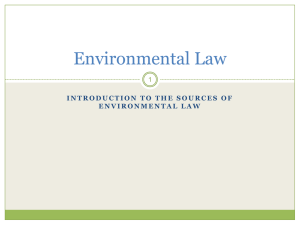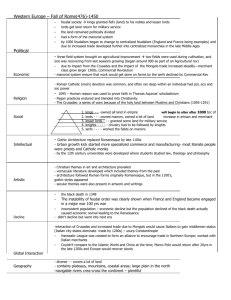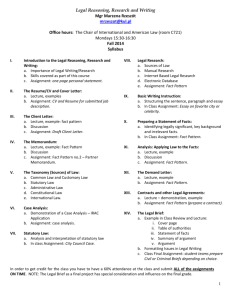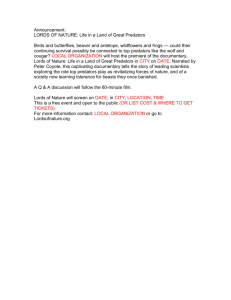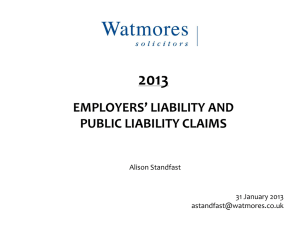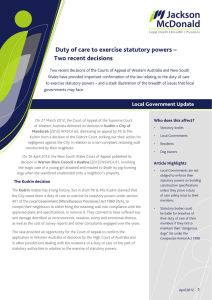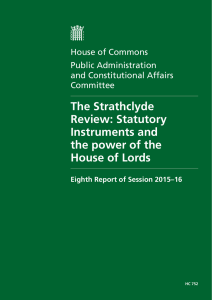LAW OF TORT UPDATE
advertisement
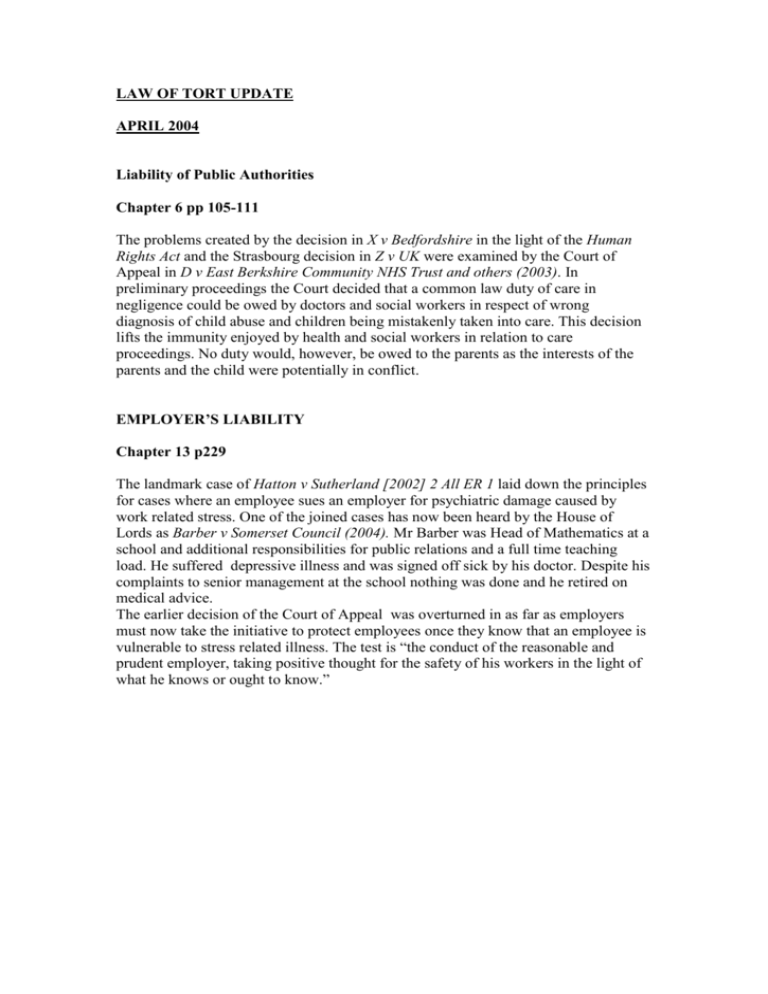
LAW OF TORT UPDATE APRIL 2004 Liability of Public Authorities Chapter 6 pp 105-111 The problems created by the decision in X v Bedfordshire in the light of the Human Rights Act and the Strasbourg decision in Z v UK were examined by the Court of Appeal in D v East Berkshire Community NHS Trust and others (2003). In preliminary proceedings the Court decided that a common law duty of care in negligence could be owed by doctors and social workers in respect of wrong diagnosis of child abuse and children being mistakenly taken into care. This decision lifts the immunity enjoyed by health and social workers in relation to care proceedings. No duty would, however, be owed to the parents as the interests of the parents and the child were potentially in conflict. EMPLOYER’S LIABILITY Chapter 13 p229 The landmark case of Hatton v Sutherland [2002] 2 All ER 1 laid down the principles for cases where an employee sues an employer for psychiatric damage caused by work related stress. One of the joined cases has now been heard by the House of Lords as Barber v Somerset Council (2004). Mr Barber was Head of Mathematics at a school and additional responsibilities for public relations and a full time teaching load. He suffered depressive illness and was signed off sick by his doctor. Despite his complaints to senior management at the school nothing was done and he retired on medical advice. The earlier decision of the Court of Appeal was overturned in as far as employers must now take the initiative to protect employees once they know that an employee is vulnerable to stress related illness. The test is “the conduct of the reasonable and prudent employer, taking positive thought for the safety of his workers in the light of what he knows or ought to know.” Nuisance Chapter 16 pp 262-3 In Marcic v Thames Water Utilities Ltd [2004] 1 All ER 135 there had been regular and serious flooding of the claimant’s house and garden from sewage which had become inadequate as a result of building works. The Court of Appeal had held ([2002] 2 All ER 55) that there had been an infringement of Article 8 (right to a private life and inviolability of the home0 and of Protocol 1 Article 1 ( right to enjoyment of possessions) and that the defendants conduct amounted to a private nuisance. The House of Lords looked at the statutory regulatory scheme, which imposed a duty on the defendants to ensure that its area was ‘effectually drained,’ which the claimant’s property was not. The relevant act however, (Water Act 1991) provides that the sole method of enforcing the duty is an enforcement order made by the regulator, with an action for breach of statutory duty where the order is not complied with. No order had been requested in this case. The claimant argued that he was asserting rights not based on the section of the statute and was therefore not barred. The House noted that there was a consistent line of cases where the courts had rejected claims in nuisance where earlier statutes had had provided self contained and self-sufficient provisions. The Court of Appeal had departed from this line of authority by stating that the sewage authority should be in the same position as the landowner in cases such as Goldman v Hargrave (see p267) The House of Lords did not agree with this interpretation, as this would sabotage the statutory scheme. In respect of the Convention claim the House stated that the question was whether the statutory scheme was ‘Convention-compliant.’ The answer to this was to be found in Hatton v United Kingdom (2003) where the Strasbourg court ruled that in this type of case, where there were many policy considerations, considerable weight should be given to the domestic policy maker. The House concluded, with reservations, that the scheme was compliant as it struck a fair balance between the respective competing interests. The claim therefore failed. Rylands v Fletcher Chapter 17 The House of Lords decision in Transco v Stockport [2003] 3 WLR 1467 also deals with relationship between statutory remedies and common law claims. There was a leak in a water pipe supplying a block of flats but the pipe was part of the landowner’s ‘private’ system’ as opposed to the statutory undertaker’s ‘public system’. Damage was caused to a nearby embankment. The provision of a water pipe was held to be a natural use of the land. Counsel for the defence submitted that the whole basis of the rule should be reviewed. The House rejected the abolition of the rule on four grounds; (i) there is a small category of cases where liability should be strict (ii) the statutory imposition of strict liability in many hazardous situations was predicated on the rule and its abolition might destabilize these regimes (iii) consistency with the approach in Cambridge Water (iv) consistency with civil law jurisdictions. The rule was firmly stated to be an aspect of private nuisance with no claim for personal injuries. Students who are undertaking revision on the rule should definitely read the judgments. Trespass to the Person and Privacy Chapters 19 and 20 The question of invasion of privacy in the context of a strip search of a mother and son on a prison visit was considered by the House of Lords in Wainright v Home Office [2003] 4 All ER 969. The trial judge had held that there was an actionable invasion of privacy as the searches were excessive and irregular and related this to Wilkinson v Downton [1897] 2QB 57. The Court of Appeal rejected this as an unacceptable extension of the principle. The House of Lords also rejected this application as it required an intention to cause harm, which was not present in this case and did not cover the infliction of distress. The case predated the Human Rights Act and the question of whether there would be a remedy under Article 8 to be enforced through ss6 and 7 was left open. Vicarious Liability Chapter 22 pp 336-7 The House of Lords decision in Lister v Hesley Hall was applied by the Court of Appeal in Mattis v Pollock (2003) The Times 16TH July. A doorman at a nightclub stabbed the claimant in the vicinity of the club in revenge for an earlier violent attack. The doorman was held to have committed this attack in the course of his employment. The club owner was vicariously liable for his actions.
